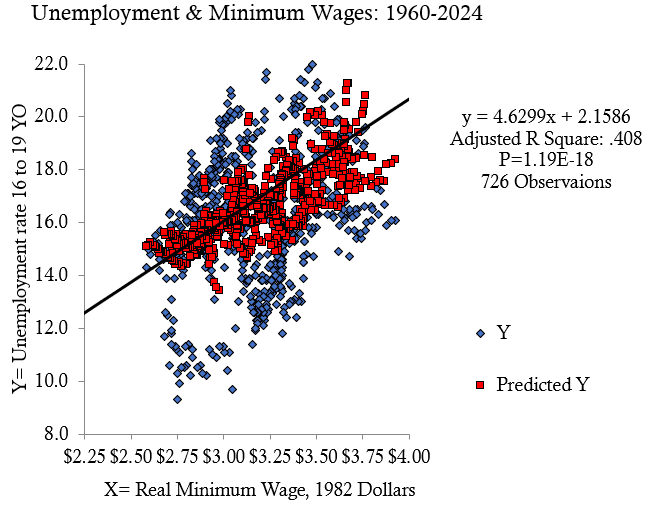Most Americans think that the minimum wage rate should be increased, and that an increase would help, or at least not harm, “the economy”1. The phrase “harm the economy” is potentially misleading. The economy is just people interacting according to scarcities, laws, and policies. The economy doesn’t exist apart from the human race. Harming (or helping) the economy means harming (or helping) real people.
Increasing the minimum wage most directly affects teenage workers. Increasing the minimum wage increases the unemployment rate among teens (see the graph below). Teens who are rendered unemployed by the minimum wage are harmed by this policy. Teens who still have work after minimum wage increases yield a clear financial gain, unless their weekly hours are cut2.
A new study by Michael Davies indicates that a 10% minimum wage increase leads to an 11% increase in workplace injuries3. Why? The economic reasoning here is simple; employers pay employees according to the profitability of hiring labor. If you increase the legal wage rate for less productive-less reliable teenagers those who employ teens will feel pressured to cut corners on workplace safety and comfort, to maintain profits.
People who do not understand economics are easily misled into believing that there are simple easy fixes to perceived social problems- if some people appear to be poor, just raise wages and the problem is solved. This is nonsense. The teenagers who gain some additional income from minimum wage increases don't necessarily reside in poor households. All of the teens who experience a financial benefit from minimum wage increases are at greater risk of workplace injury.
Most economists think that the legal minimum wage is the least effective anti-poverty program, and we are right4. The legal minimum wage does not provide substantial assistance to poor Americans; it does impose substantial financial and physical costs. The legal minimum wage is inefficient and inhumane; it should be abolished.
41% of Americans think that an increase in the minimum wage would help the economy. 13% believe that the minimum wage increase would have no effect on the economy. 38% believe that at minimum wage increase would harm the economy. See https://www.rasmussenreports.com/public_content/business/jobs_employment/most_favor_10_50_minimum_wage
A study by Neumark and Wascher indicates that the often cited example of the 1991 New Jersey minimum wage increase reduced teen labor demand 4%. See https://ideas.repec.org/p/nbr/nberwo/5224.html
See this study here https://papers.ssrn.com/sol3/papers.cfm?abstract_id=5062047
See https://dwmackenzie.substack.com/publish/posts/detail/138425274?referrer=%2Fpublish%2Fposts%3Fsearch%3DWhat%2520do%2520economists%2520think%2520about%2520the%2520minimum%2520wage

